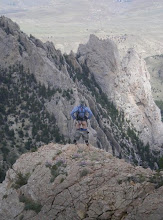I recently undertook an extended solo backtracking trip, in the Pasayten Wilderness of Washington. My purposes were explicit; I wanted a spiritual connection with the land, the land of my birth, the land of mountains that I fell in love with as a child and grew me into an ardent lover of the more-than-human world.
My packing preparations were obsessively detailed, down to the amount of grams of fat I would be ingesting each day. I had to keep weight to an absolute minimum. However, I prioritized special items to aid me in my quest of land-communion, including an elk-skin shamanic drum that i had made for just this occasion. Among the relatively few items that survived the cuts were my smoking supplies. An herbal smoking mix with rolling papers, along with a small quantity of marijuana, and a plastic butane lighter. Again, I saw these items as part of my tool kit for connecting with the spirits of the trees and rocks and skies. I was self-consciously styling myself in the shamanic tradition, replete with drum and ceremonial smokes.
Now then, let’s play a little game. Let’s say that the night I spent on top of Tatoosh Buttes had played out a little differently. As it was, it was something of a trial. I passed the night rolled inside my tarp, warm and dry but cramped and miserable, as the rain and wind struck a deafeningly discordant beat on my plastic shelter. I maintained an exhausted vigilance for the first note of thunder, determined to roust myself upon the report and hustle my ass down the mountain, off of the exposed butte. Getting back to our game, let’s say the thunder had indeed rolled, and the lightning struck me as I tried to descend the mountain. Struck me dead, so that I tumbled off of the trail and came to rest out of sight of other hikers.
A season passes, my flesh is consumed by scavengers and microbes. A few more seasons pass, my clothes decay. A few dozen more, my backpack and sleeping bag are blown to the wind in tatters, mostly photodegraded by UV radiation. Spin the clock forward one hundred, two hundred, three hundred years, and what is left? The Tatoosh Buttes are as glorious as ever, the mountains are my sacred resting place, but what the heck is that damned plastic lighter still doing here?
Paradigm shift. Take a simple, unquestioned “this is the way it is” aspect of daily life. Strip away our cultural filter, the filter that has told us “this is the way it is” every day of our lives. Take a look at that plastic butane lighter. What is it made of? Petroleum by-products, hydrocarbons, the harvest of the energy of 100 million years ago. You know, the finite resource that leads America to spend billions of dollars on a military presence in the Middle East. Lighters don’t grow on trees, you know. We know where lighters come from, we know all about the costs of hydrocarbons, geopolitical economic and environmental. And we know where they go when we toss them out the window, on the ground, into the weeds, even on rare occasion into a trashcan and eventually to an anaerobic landfill. WHerever they end up, the decomposers of our world have no use for them, so they remain, mankind’s durable gift to the world.
Why do we use lighters? Do we have an alternative? Of course we do, and it does happen to grow on trees, or even better, most matchbooks that you’d pick up in a bar consist of cardboard matchsticks, which is just recycled paper scraps. Are lighters cheaper than a matchbook? No... So why do we all use them, tree-hugging potheads and off-roading rednecks alike?
How much inconvenience would it be to never consume another lighter? How much inconvenience would it be to get your matches free, from a bar. To light up, and then toss a little shred of recycled scrap that will be eaten up by decomposers. To enjoy the ultimate convenience, Fire Made Easy, without participating in the losing battle of Mand & Hydrocarbon.
Go for it. Storm the moral high ground. Shock your friends. Do the paradigm shift.
Sunday, August 26, 2012
Subscribe to:
Comments (Atom)





